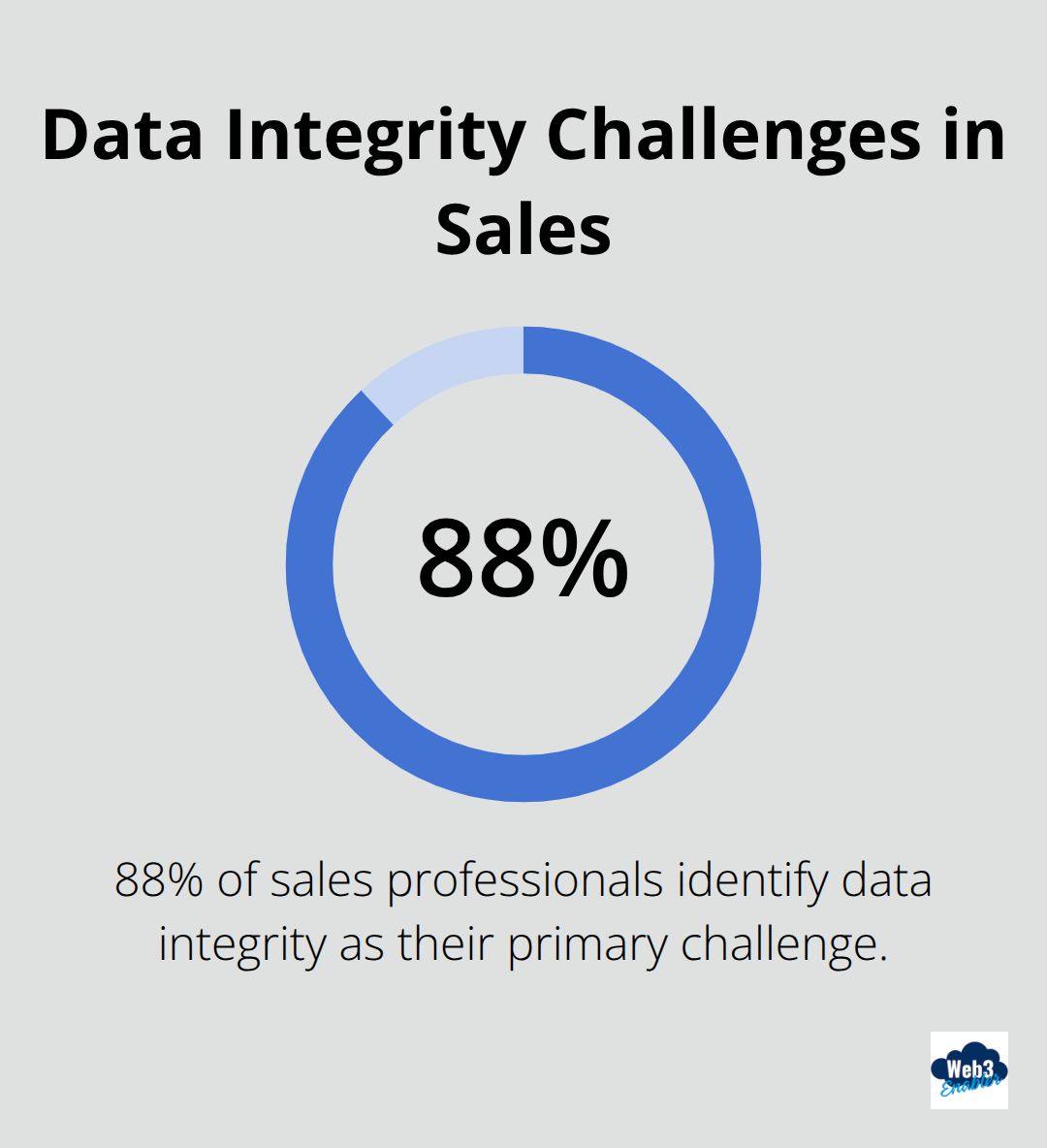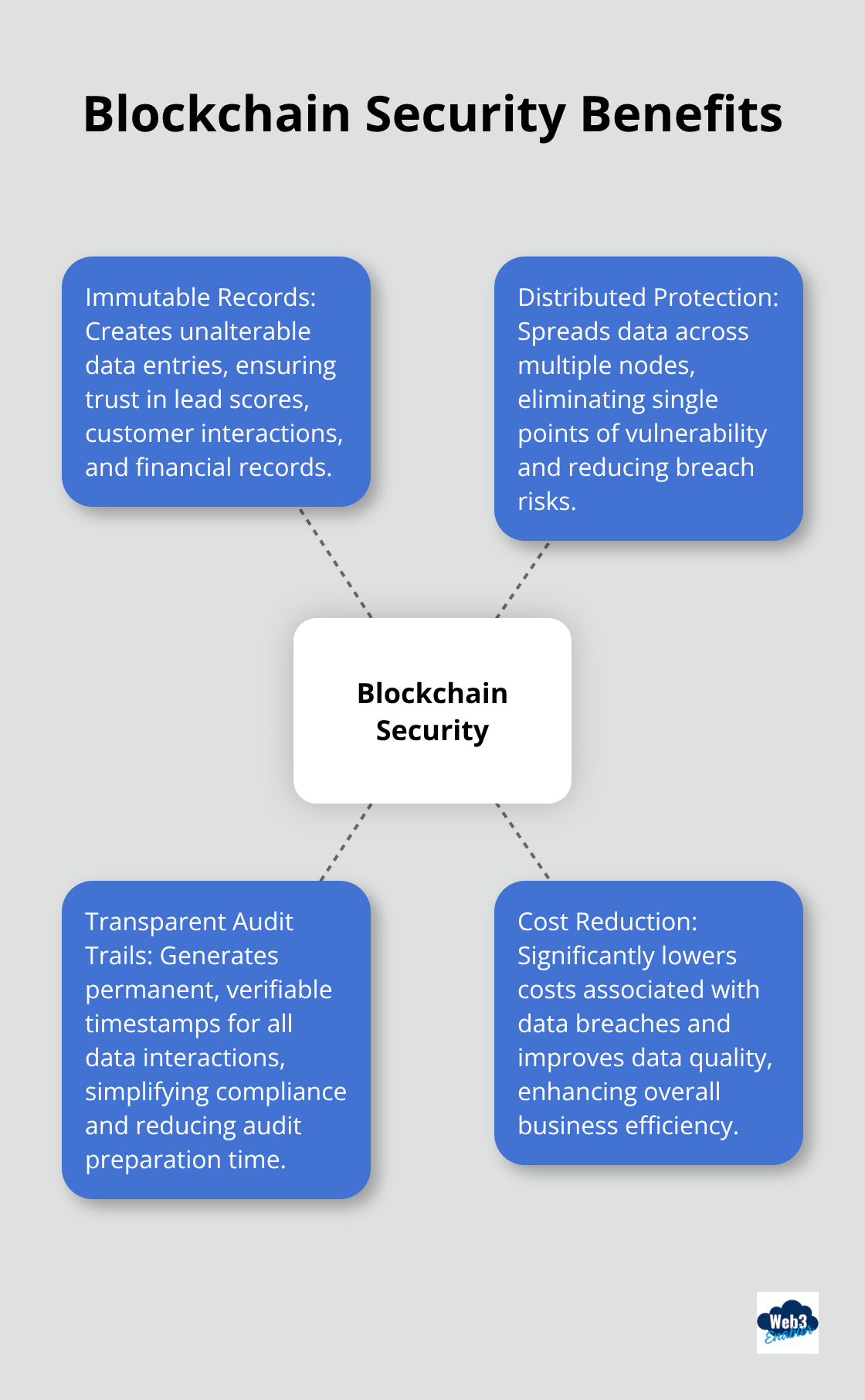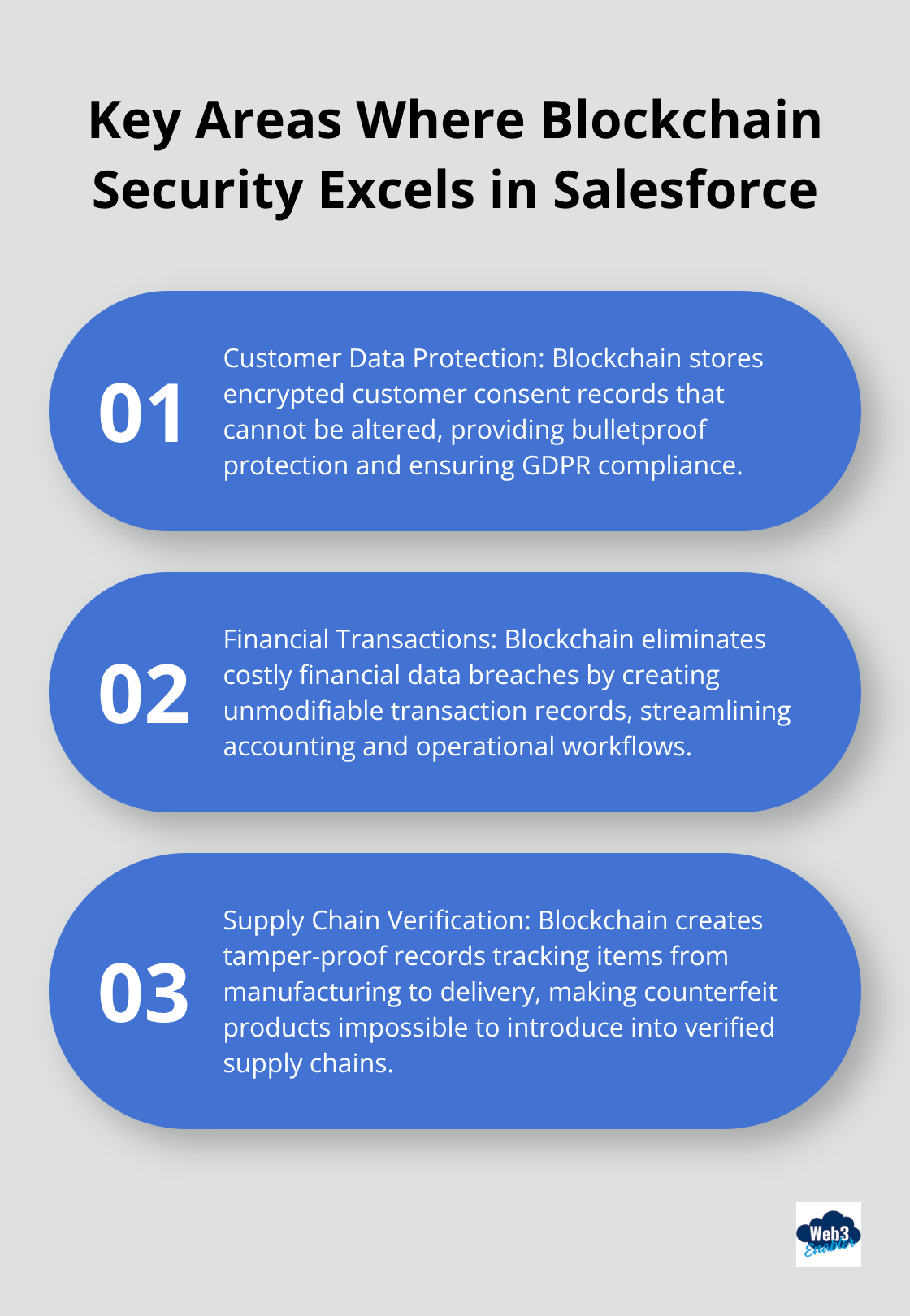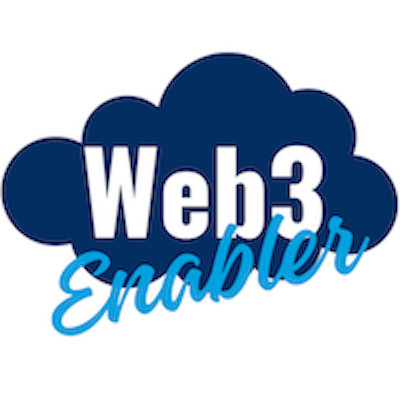
Your Salesforce data sits behind walls that hackers keep finding ways to climb. Traditional security measures aren’t cutting it anymore, and those data breach headlines keep getting scarier.
We at Web3 Enabler see blockchain security as the game-changer your business needs. It’s time to stop playing defense and start building unbreakable protection for your most valuable asset.
Why Your Current Salesforce Security Isn’t Working
Here’s the uncomfortable truth about Salesforce security: 88% of sales professionals identify data integrity as their primary challenge, yet businesses keep pretending their current protections are bulletproof. The average cost of a data breach hit $4.45 million in 2023, and traditional CRM systems report a 12% average revenue loss due to data quality issues. Your centralized database creates a honey pot that hackers love to target, and when they break in, they get everything at once.

The Single Point of Failure Problem
Centralized systems put all your eggs in one very hackable basket. When your Salesforce instance gets compromised, attackers don’t just steal one customer record – they walk away with your entire customer database, financial data, and business intelligence. This architecture makes you vulnerable because there’s no distributed protection, no redundancy, and no way to isolate damage when breaches occur.
Compliance Nightmares Keep Getting Worse
GDPR fines can reach 4% of your annual revenue, and data protection regulations multiply faster than your legal team can track them. Traditional audit trails can be modified or deleted (leaving you defenseless when regulators come knocking). Your current system can’t prove data hasn’t been tampered with, and manual compliance processes create gaps that cost millions when discovered during audits.
Data Integrity Issues Drain Revenue
Traditional systems can’t guarantee that your customer data remains accurate and untampered. Sales teams waste time on corrupted leads, marketing campaigns target outdated information, and financial reports contain errors that cascade through your entire operation. These data quality problems don’t just frustrate your team – they directly impact your bottom line through lost opportunities and operational inefficiencies.
The solution lies in a completely different approach to data security, one that eliminates these fundamental weaknesses through decentralized protection.
How Blockchain Actually Fixes These Security Problems
Blockchain transforms your Salesforce security by creating records that physically cannot be altered once written. When customer data gets stored on a blockchain, cryptographic hashing makes tampering mathematically impossible without detection. This means your sales team can trust that lead scores, customer interactions, and financial records remain exactly as entered.
Traditional databases allow administrators to modify historical data without traces, but blockchain creates permanent fingerprints for every transaction. Blockchain implementation provides enhanced security protection that can significantly reduce costs associated with data breaches, making this protection both stronger and more cost-effective than current methods.
Distributed Protection Eliminates Vulnerability Points
Blockchain spreads your data across multiple nodes instead of storing everything in one location that hackers can target. When attackers compromise one node, they still cannot access or manipulate your complete dataset because consensus mechanisms require majority agreement for any changes.

This distributed architecture means no single server failure can bring down your entire system or expose all customer information simultaneously. Companies using blockchain for verified B2B leads report significant reductions in acquisition costs due to improved data quality and security. The decentralized validation process makes manipulation by any single entity nearly impossible, creating robust protection that scales with your business growth.
Transparent Audit Trails Solve Compliance Headaches
Blockchain creates immutable audit trails that regulators can verify independently, showing exactly when data was accessed, modified, or shared. Every interaction with customer records generates a permanent timestamp that cannot be backdated or deleted (giving you bulletproof evidence for compliance audits).
Smart contracts can automate compliance monitoring and flag potential violations before they become expensive regulatory problems. This transparency cuts processing times by up to 50% compared to manual audit preparation, while providing the complete visibility that GDPR and other regulations demand from modern businesses.
These technical advantages translate into real business benefits when applied to specific use cases where data security matters most.
Where Blockchain Security Works Best in Salesforce
Customer data protection becomes bulletproof when blockchain stores encrypted customer consent records that hackers cannot alter after creation. Financial services firms using immutable consent logs report zero GDPR violations during audits because blockchain provides verifiable proof that customers agreed to specific data uses at exact timestamps.

Marketing teams can track customer preferences across multiple touchpoints with complete transparency, while privacy managers gain tools to demonstrate compliance without manual documentation processes. Organizations that automate commission structures with blockchain benefit from instant payouts and transparent transaction records (which eliminates disputes over calculation methods or payment schedules).
Financial Transactions Get Military-Grade Protection
Payment processing through blockchain eliminates costly financial data breaches because transaction records cannot be modified after execution. Companies that use blockchain for verified B2B leads report significant reductions in acquisition costs due to improved data quality.
Automated workflows triggered by blockchain events cut processing times significantly. Real-time transaction confirmations streamline accounting and operational workflows within Salesforce, while finance teams receive instant visibility into payment statuses through Slack and email notifications.
Supply Chain Verification Stops Fraud Cold
Product authentication through blockchain creates tamper-proof records that track items from manufacturing to customer delivery. This approach makes counterfeit products impossible to introduce into verified supply chains (because every step gets recorded permanently on the distributed ledger).
Mattel’s partnership with Salesforce to create NFTs resulted in increased new customer reach, which demonstrates how blockchain verification enhances marketing effectiveness while protecting brand integrity. Businesses can verify supplier credentials, track product origins, and provide customers with proof of authenticity that builds trust and reduces return rates from quality concerns.
Customer Journey Transparency Builds Trust
Blockchain tracks customer interactions across multiple touchpoints without allowing manipulation of historical data. Sales teams access verified lead scores and customer engagement metrics that remain accurate throughout the entire sales cycle.
This transparency helps businesses comply with evolving data privacy regulations while empowering customers with control over their information. The immutable nature of blockchain records means customer service representatives can access complete interaction histories that haven’t been altered or deleted by previous team members.
Final Thoughts
Blockchain security delivers protection that traditional Salesforce systems simply cannot match. While centralized databases create vulnerability points that cost businesses $4.45 million per breach, blockchain’s distributed architecture makes tampering mathematically impossible and eliminates single points of failure. The numbers speak volumes: companies that use blockchain report 50% faster processing times and significant reductions in data quality costs.
This technology transforms compliance from a manual nightmare into automated transparency that regulators can verify independently. Implementation success depends on strategic planning and the right partner choice. Businesses need solutions that integrate seamlessly with existing Salesforce workflows rather than create additional complexity (which most blockchain implementations unfortunately do).
The global blockchain market’s projected growth to $1.879 trillion by 2034 reflects this technology’s inevitable role in enterprise security. Web3 Enabler provides Salesforce Native blockchain solutions available on the AppExchange, which connect blockchain technology with existing corporate infrastructure through tools built for businesses rather than crypto speculation. The future belongs to organizations that embrace blockchain integration now, before their competitors gain the unbreakable security advantage.



